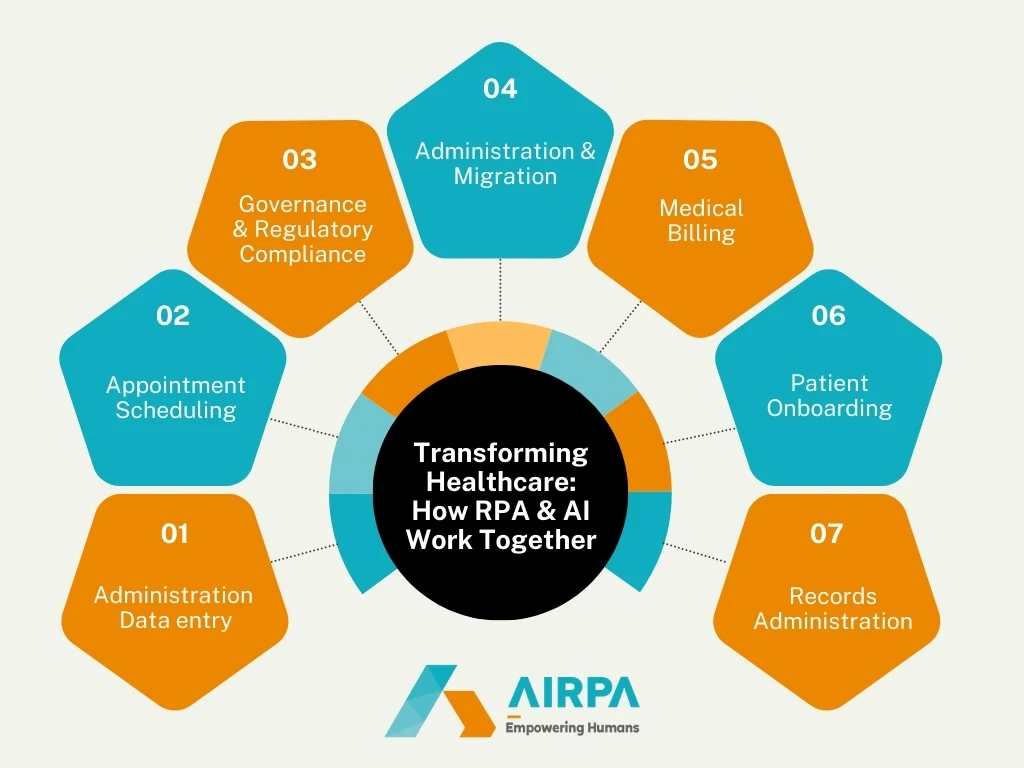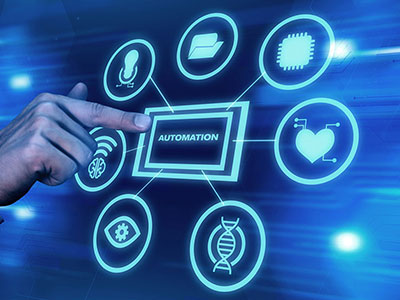
Where to Leverage AI & RPA in Healthcare
Table of Contents
In today's fast-paced healthcare landscape, efficiency and accuracy are paramount. Robotic Process Automation (RPA) is the game-changing solution that empowers healthcare organizations to streamline their operations, reduce costs, and deliver exceptional patient experiences.
Talk to Our Automation Expert!
+91 855-975-9735
Want to experience Intelligent Automation in Action or Need help Building the Right Automation Plan?
Imagine a world where administrative burdens, data entry, and repetitive tasks are no longer a drain on your valuable resources. RPA automates these mundane processes, freeing up your staff to focus on what truly matters – providing outstanding patient care.
Embrace the future of healthcare with RPA's intelligent automation. Claims processing, inventory management, and patient engagement initiatives are streamlined, ensuring timely reimbursements, optimal supply levels, and effective communication with your patients.

What are the Potential Use Cases of RPA along with AI in Healthcare Industry?

RPA coupled with AI technology automates work in many sectors of healthcare businesses, from front-office operations and record management to invoicing and processing. Here are some use cases of RPA in healthcare
- RPA automates administrative data entry, a key healthcare operation that is prone to errors when done manually. Data can be collected from multiple sources, translated into structured data, and entered into a database.
- Healthcare organizations can use RPA to automate appointment scheduling by analyzing patient symptoms, doctor availability, and other data to improve patient admission and discharge. This eliminates manual tasks.
- RPA enhances governance and regulatory compliance by collecting complete logs and creating accurate audit reports.
- Data entry, administration, and migration. Automation streamlines tasks such as onboarding new employees and patient records by automating documenting, printing, scanning, and data entry. Organizations can also program RPA bots to provide discharge and medication guidelines, as well as inform patients about tests and appointments.
- RPA in Medical billing: RPA bots automate repetitive billing and claims contacts between healthcare providers and insurance companies, including follow-ups and first-line inquiries.
- RPA simplifies patient onboarding by collecting medical data, insurance information, and demographics. It also enables staff to generate and update EHRs and EMRs.
- RPA bots enable consistent and accurate records administration in healthcare businesses, ensuring stringent compliance requirements for patient information and medical data.
What you Need to Consider before Implementing the RPA services for Healthcare Industry?
A proper implementation design must be created before investing in RPA services in the healthcare industry. For instance, while it may not be necessary in your specific situation, the idea of integrating AI, ML, and speech recognition into your RPA seems really good. Ultimately, RPA is not necessary for every healthcare facility.
For this reason, we advise consulting an expert software supplier that can suggest substitute technologies that will be most beneficial for your situation.
Furthermore, in order to use RPA in the healthcare industry, there must be established guidelines that the program can mimic. It will be difficult to train robots efficiently if your healthcare business lacks a strong foundation.
Let’s catch up with the below checklist to getting an effective RPA Solution
1. Determine your needs. Set your expectations and determine the desired impact. The more clearly you define your goals, the more accurate the program will be.
2. Hire a skilled RPA Expert. The more capabilities your IT specialist have, the better solution this individual will provide.
3. Stay involved throughout the project. Many requestors will place an order, select an executor, and then forget about the project until they receive the results. To get what you need out of RPA development, you must stay in touch with your team and engage in project design and management.
4. Consider setting up a monitoring system. RPA software is heavily reliant on human behavior, so it's critical to synchronize your employees' activities with robot reactions. Otherwise, you risk losing data due to a single manual password update.
5. Integrate RPA with your existing software system. To be genuinely effective, each technological solution must integrate seamlessly into the overall process. That is why it is critical to implement RPA so that it can enhance the technology you already have.
Key Takeaways
The healthcare industry is burdened with high operational expenses, slow and redundant operations, stringent compliance rules, and huge patient volumes. These issues have a negative influence on the speed and quality of patient care, process management, and overall operations. Automation, much like other industries such as financial services, manufacturing, and retail, is critical to speeding healthcare's digital transformation. With numerous new technologies developing to assist this transformation, using digital capabilities such as robotic process automation in healthcare can boost efficiency and improve the patient experience.
Automation is a powerful tool that powers and delivers connected experiences across the healthcare sector. Check out AIRPA’s Healthcare services to learn more about how automation can help your healthcare organization do more with less.
Popular Tags:
Related Articles

How Automation and AI are Reshaping the Fintech Landscape
Is AI the driving force behind fintech's rapid evolution?





